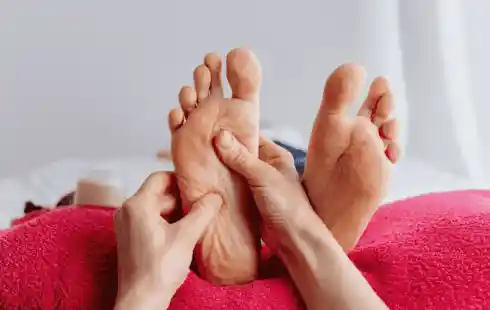
Pantone's Color of the Year an Endless Neutral Loop
Section: Fashion
 Reflexology, an ancient practice dating back thousands of years, has gained renewed attention in modern times for its potential health benefits. This holistic therapy, rooted in the belief that specific points on the hands, feet, and ears correspond to different organs and systems in the body, is increasingly recognized as a complementary approach to promoting well-being and relieving various health conditions.
Reflexology, an ancient practice dating back thousands of years, has gained renewed attention in modern times for its potential health benefits. This holistic therapy, rooted in the belief that specific points on the hands, feet, and ears correspond to different organs and systems in the body, is increasingly recognized as a complementary approach to promoting well-being and relieving various health conditions.
Understanding Reflexology: A Holistic Approach to Wellness
Reflexology operates on the principle that applying pressure to specific reflex points on the body can stimulate the corresponding organs and systems, promoting balance and healing. By targeting these reflex points, practitioners aim to alleviate tension, improve circulation, and enhance the body's natural ability to heal itself.
This non-invasive therapy is often sought after for its ability to promote relaxation and reduce stress, making it an appealing option for individuals seeking relief from the demands of modern life. Additionally, reflexology is believed to support overall health by addressing imbalances in the body and fostering a sense of harmony and well-being.
Exploring the Evidence: What Science Says About Reflexology
While scientific research on reflexology is still evolving, several studies have yielded promising findings regarding its potential health benefits. A systematic review published in the Journal of Clinical Nursing found that reflexology may be effective in reducing pain and anxiety in various patient populations, including those undergoing surgery and cancer treatment.
Moreover, research suggests that reflexology may have a positive impact on specific health conditions, such as migraines, premenstrual syndrome (PMS), and irritable bowel syndrome (IBS). A study published in Complementary Therapies in Clinical Practice reported that reflexology was associated with a significant reduction in migraine frequency and intensity among participants.
Incorporating Reflexology into Your Wellness Routine
Whether seeking relief from chronic pain, managing stress, or simply promoting overall well-being, reflexology offers a gentle and natural approach to supporting health and vitality. Sessions typically last between 30 to 60 minutes and involve the application of pressure to specific reflex points on the feet, hands, or ears.
Many individuals find reflexology to be a relaxing and rejuvenating experience, with benefits that extend beyond the physical realm to encompass mental and emotional well-being. As with any complementary therapy, it's essential to consult with a qualified practitioner and communicate your health goals and concerns before beginning treatment.
Harnessing the Healing Power of Reflexology
As interest in holistic approaches to health and wellness continues to grow, reflexology stands out as a time-honored practice with the potential to promote healing and enhance quality of life. Whether used as a standalone therapy or in conjunction with conventional medical care, reflexology offers a gentle yet powerful means of supporting overall health and vitality.
By tapping into the body's innate healing mechanisms and promoting balance and harmony, reflexology empowers individuals to take an active role in their well-being and cultivate a greater sense of vitality and resilience. As research continues to shed light on its potential benefits, reflexology remains a valuable tool in the quest for holistic health and wellness.

Section: Fashion

Section: News

Section: Fashion

Section: Arts

Section: Politics

Section: Health Insurance

Section: News

Section: News

Section: News

Section: Arts
Both private Health Insurance in Germany and public insurance, is often complicated to navigate, not to mention expensive. As an expat, you are required to navigate this landscape within weeks of arriving, so check our FAQ on PKV. For our guide on resources and access to agents who can give you a competitive quote, try our PKV Cost comparison tool.
Germany is famous for its medical expertise and extensive number of hospitals and clinics. See this comprehensive directory of hospitals and clinics across the country, complete with links to their websites, addresses, contact info, and specializations/services.
Join us for an enchanting Christmas adventure at the Münchner Marionettentheater! Experience the marionette play 'Der verschwundene Wunschzettel' by Siegfried Böhmke, featuring our beloved Kasperl Larifari and his little friend Stupsi. As Christmas approaches, both Kasperl and Stupsi have prepared...



No comments yet. Be the first to comment!